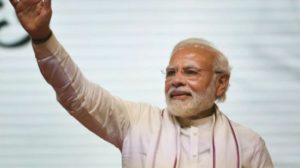
The leaders of India, Israel, the United States, and the United Arab Emirates (I2U2) will next week hold a virtual summit to discuss ways to ensure food security in the wake of the Russia-Ukraine conflict as well as ways to boost trade and economic relations among the four nations.
Prime Minister Narendra Modi will join President Joe Biden of the US, President Mohammed bin Zayed Al Nahyan and President Naftali Bennett of Israel for the virtual summit, which will formally launch the ‘I2U2’, a new bloc comprising the four nations.
The virtual summit will happen during Biden’s visit to Israel on July 13. The US president will also visit the West Bank to hold discussions with Palestinian Authority before travelling to Saudi Arabia.
India’s move to join the US, the UAE and Israel in a new bloc reflected its keenness to take advantage of the Abraham Accords to deepen engagement with Israel without risking its ties with the UAE and the other Arab states.
The US is also keen to explore security cooperation among the four nations within the framework of the new grouping.
‘Each of these countries are technological hubs. Biotechnology, of course, is prominent in each of these countries as well,’ Ned Price, the spokesperson of the US State Department, said.
He pointed out that Israel and the UAE had ‘deepened their relationship in recent years, including in the economic realm’.
He was apparently referring to the developments after the signing of the Trump administration-brokered Abraham Accords — the pacts Israel had inked with Bahrain and the UAE in September 2020 and thus setting in motion the process of normalisation of its relations with the two nations.
India welcomed the Abraham Accords, stating that it always supported peace and stability in West Asia – a region, that is considered as its ‘extended neighbourhood’.
‘India, of course, is a massive market. It is a massive consumer market. It’s a massive producer of high-tech and highly sought-after goods as well,’ he added, noting that the US and the three other nations could ‘work together, whether it’s technology, whether it’s trading, whether it is climate, whether it’s fighting against Covid-19, and potentially even security as well.’
A senior US official said the first I2U2 summit would also give Biden, Modi, Bennett and Zayed Al Nahyan an opportunity to discuss food security.
The I2U2 was conceived, when External Affairs Minister S Jaishankar visited Jerusalem and, along with Israeli Foreign Minister Yair Lapid, joined the US Secretary of State, Antony Blinken, and the UAE Foreign Minister, Abdullah bin Zayed Al Nahyan, in a video conference on October 18 last year. The virtual meeting ended with the decision to launch an international forum for economic cooperation to harness the ‘unique array of capabilities, knowledge and experience’ of the four nations.
India has robust bilateral security cooperation with Israel, the US and the UAE. But it has not yet made it clear if it would like to explore security cooperation within the framework of the new four-nation grouping.
New Delhi has been cautious about adding military heft to the ‘Quad’, another four-nation coalition India, along with Australia, Japan and the US, forged to counter China’s hegemonic aspirations in the Indo-Pacific region. In the past stonewalled the attempts by the US to turn the ‘Quad’ into a NATO-like security alliance for the Indo-Pacific region, not only because it was reluctant to be part of a move overtly adversarial to China, but also because such a move would have had implications for India’s decades-old strategic partnership with Russia.
India insisted that the Quad should continue with its benign agenda, like supplying anti-Covid-19 vaccines to the Indo-Pacific nations, helping them build infrastructure and supporting their pursuit of economic development in order to stop their drift towards China.




 Driving Naari Programme launched in Chandigarh
Driving Naari Programme launched in Chandigarh






























